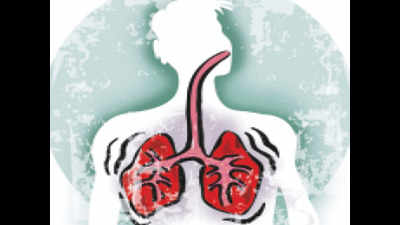- News
- City News
- chennai News
- Chennai: MMC develops two potential anti-tuberculosis drugs, awaits patent
Trending
This story is from April 13, 2019
Chennai: MMC develops two potential anti-tuberculosis drugs, awaits patent

Representative image
CHENNAI: Two drug formulations developed in Madras Medical College have shown promise to effectively control tuberculosis bacteria in petridishes in laboratory conditions. Patents have been filed for the two novel synthetic molecules developed by the College of Pharmacy, Madras Medical College principal A Jerad Suresh said.
India accounts for one fourth of the global TB incidence. In 2015, an estimated 28 lakh cases occurred and 4.8 lakh people died due to TB.“We hope the new formulations will be more effective than the existing combination. But it has to undergo several phases of trials, including ones on animal and humans, before it can be used on patients. If that happens, it may lead to solutions for drug resistant strains of TB,” he said, refusing to give more details about the molecules.
As a broader step, the college has decided to apply to the Central Drugs Standard Control Organisation (CDSCO) seeking permission for mass production of drugs, particularly the antimicrobial solutions it has been producing on campus.
With an estimated saving of more than Rs 32.08 lakh per year for just one hospital, the college has convinced the state health department that it will be able to help all government hospitals to substantially cut down on cost of hand sanitizers. “We are strengthening our infrastructure and human resources for mass production. Eventually, we can also build capacity to manufacture drugs based on need,” said hospital dean Dr R Jayanthi.
In February, the college launched the antiseptic solution it had developed for use in hospital and college for Rs 82 for a 500ml bottle compared to the average cost of Rs 341 when purchased from the open market. The hospital, on an average uses at least 1,000 bottles of the solution every month. “We tested it in the labs and found the solution effective. We have asked doctors, nurses and paramedical staff to use them liberally. The feedback about its quality has been very good,” said Dr Jayanthi.
One the college has the licence, it will also be eligible to bid for tenders with the medical service corporation, he said.
India accounts for one fourth of the global TB incidence. In 2015, an estimated 28 lakh cases occurred and 4.8 lakh people died due to TB.“We hope the new formulations will be more effective than the existing combination. But it has to undergo several phases of trials, including ones on animal and humans, before it can be used on patients. If that happens, it may lead to solutions for drug resistant strains of TB,” he said, refusing to give more details about the molecules.
As a broader step, the college has decided to apply to the Central Drugs Standard Control Organisation (CDSCO) seeking permission for mass production of drugs, particularly the antimicrobial solutions it has been producing on campus.
With an estimated saving of more than Rs 32.08 lakh per year for just one hospital, the college has convinced the state health department that it will be able to help all government hospitals to substantially cut down on cost of hand sanitizers. “We are strengthening our infrastructure and human resources for mass production. Eventually, we can also build capacity to manufacture drugs based on need,” said hospital dean Dr R Jayanthi.
So far, medical products – medicines, equipment and disposables – for government primary health centres, secondary and tertiary care medical college hospitals is sourced through the Tamil Nadu Medical Services Corporation. The corporation purchases generic drugs from lowest bidder from across the country. The Amma Pharmacies sell quality medicines at “fair price” to people. With drug licences, the state can produce its own quality medicines to bring down the cost further.
In February, the college launched the antiseptic solution it had developed for use in hospital and college for Rs 82 for a 500ml bottle compared to the average cost of Rs 341 when purchased from the open market. The hospital, on an average uses at least 1,000 bottles of the solution every month. “We tested it in the labs and found the solution effective. We have asked doctors, nurses and paramedical staff to use them liberally. The feedback about its quality has been very good,” said Dr Jayanthi.
One the college has the licence, it will also be eligible to bid for tenders with the medical service corporation, he said.
End of Article
FOLLOW US ON SOCIAL MEDIA










